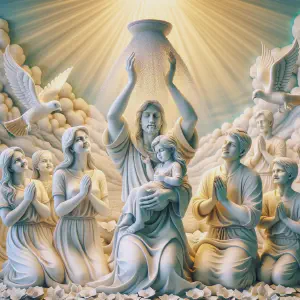The Call to Righteousness and Vigilance



Five Questions
Can you explain the significance of Paul’s message to the Romans about not being under the law but under grace?
Certainly. Paul’s message to the Romans emphasizes the transformative power of grace through Christ. While the law set boundaries and standards for righteous living, grace offers a renewed relationship with God. Paul wanted to convey that, with Christ’s sacrifice, believers are no longer judged solely by the law’s standards but are embraced by God’s grace. However, this grace isn’t a license to sin but a call to live a life aligned with God’s will.
The psalm speaks of the Lord being with Israel during times of adversity. How does this relate to the overall message of the readings?
The psalm serves as a testament to God’s unwavering protection and support. Just as Paul speaks of the transformative power of grace, the psalmist recalls times when God intervened to protect Israel from dangers. This theme of divine protection and guidance runs throughout the scriptures, reminding believers of God’s constant presence and the importance of placing trust in Him.
Jesus uses the analogy of a thief breaking into a house to emphasize preparedness. Why do you think He chose this particular analogy?
Jesus often used parables and analogies that were relatable to his audience. The unpredictability of a thief breaking into a house underscores the message that one must always be prepared for the unexpected. Just as a homeowner would want to be prepared for a potential break-in, believers should be spiritually prepared for Christ’s return, which could come at any unexpected moment.
Peter’s question to Jesus about the parable’s intended audience seems to suggest some level of confusion. Why do you think Jesus responded with another parable about the steward?
Peter’s question reflects a common human tendency to seek clarity about one’s responsibilities. By responding with the parable of the steward, Jesus emphasizes individual accountability. The faithful steward represents those who diligently serve God, while the negligent steward symbolizes those who become complacent or misuse their responsibilities. Jesus wanted to convey that every believer, regardless of their role, has a duty to remain vigilant and faithful.
The concluding message about those entrusted with more being held to a higher standard seems quite profound. Can you elaborate on its significance?
Absolutely. This message underscores the idea of responsibility and accountability. Those who have been given more resources, knowledge, or influence have a greater responsibility to use them wisely and righteously. It’s a reminder that blessings and resources come with an expectation to serve, guide, and uplift others. In the broader context of the scriptures, it’s a call for leaders, teachers, and believers to lead by example and ensure they are fulfilling their spiritual duties diligently.
Bible Study
Rom 6:12-18
Brothers and sisters:
Sin must not reign over your mortal bodies
so that you obey their desires.
And do not present the parts of your bodies to sin
as weapons for wickedness,
but present yourselves to God as raised from the dead to life
and the parts of your bodies to God
as weapons for righteousness.
For sin is not to have any power over you,
since you are not under the law but under grace.What then? Shall we sin because we are not under the law
but under grace?
Of course not!
Do you not know that if you present yourselves
to someone as obedient slaves,
you are slaves of the one you obey,
either of sin, which leads to death,
or of obedience, which leads to righteousness?
But thanks be to God that, although you were once slaves of sin,
you have become obedient from the heart
to the pattern of teaching to which you were entrusted.
Freed from sin, you have become slaves of righteousness.
Paul, a former persecutor of Christians who underwent a transformative conversion and became one of Christianity’s most influential apostles. His role here is as a teacher and guide to the Roman Christian community. Paul emphasizes the idea that grace through Christ has freed believers from the shackles of sin. He contrasts the servitude to sin with the liberation found in righteousness. This passage aligns closely with Catholic values, especially the teachings on grace, the sacrament of reconciliation, and the importance of avoiding sin. It underscores the inherent freedom in choosing righteousness over sin, aligning with the first commandment, which calls for the love and worship of God above all else.
Ps 124:1b-3, 4-6, 7-8
Had not the LORD been with us,
let Israel say, had not the LORD been with us–
When men rose up against us,
then would they have swallowed us alive;
When their fury was inflamed against us.
Then would the waters have overwhelmed us;
The torrent would have swept over us;
over us then would have swept the raging waters.
Blessed be the LORD, who did not leave us
a prey to their teeth.
We were rescued like a bird
from the fowlers’ snare;
Broken was the snare,
and we were freed.
Our help is in the name of the LORD,
who made heaven and earth.
This psalm is about the Israelites, recounting their experiences of divine intervention. They recognize God’s role as their protector and savior. Throughout their history, the Israelites faced numerous adversities, and this psalm is a testament to God’s unwavering support. The passage aligns with Catholic values, particularly the acts of mercy where God protects and comforts His people. The message also resonates with the first commandment, emphasizing trust in God and acknowledging His sovereignty over creation.
Lk 12:39-48
Jesus said to his disciples:
“Be sure of this:
if the master of the house had known the hour
when the thief was coming,
he would not have let his house be broken into.
You also must be prepared,
for at an hour you do not expect, the Son of Man will come.”Then Peter said,
“Lord, is this parable meant for us or for everyone?”
And the Lord replied,
“Who, then, is the faithful and prudent steward
whom the master will put in charge of his servants
to distribute the food allowance at the proper time?
Blessed is that servant whom his master on arrival finds doing so.
Truly, I say to you, he will put him
in charge of all his property.
But if that servant says to himself,
‘My master is delayed in coming,’
and begins to beat the menservants and the maidservants,
to eat and drink and get drunk,
then that servant’s master will come
on an unexpected day and at an unknown hour
and will punish the servant severely
and assign him a place with the unfaithful.
That servant who knew his master’s will
but did not make preparations nor act in accord with his will
shall be beaten severely;
and the servant who was ignorant of his master’s will
but acted in a way deserving of a severe beating
shall be beaten only lightly.
Much will be required of the person entrusted with much,
and still more will be demanded of the person entrusted with more.”
Jesus uses parables to impart wisdom and teachings. The parable underscores the importance of vigilance, responsibility, and the unpredictable nature of the final judgment. Peter’s inquiry seeks clarity, and Jesus’ response emphasizes individual accountability, stewardship, and the consequences of one’s actions. This passage aligns with various Catholic catechisms, especially teachings related to the final judgment, the importance of vigilance in faith, and the responsibility that comes with blessings. The parable also resonates with the ten commandments, particularly the commandments that urge righteousness in actions and thoughts.
Lessons
In these sacred passages, the Lord, through Paul, invites us to embrace the liberating power of grace, urging us to turn away from sin and toward righteousness. The psalm beautifully captures the essence of God’s unwavering protection, reminding us that even in the face of adversity, His love and mercy remain our steadfast shield. Through the words of Jesus in the Gospel of Luke, we are taught the paramount importance of vigilance in our faith journey. He reminds us that just as a steward must be diligent in his duties, we too should be prepared and steadfast in our devotion, for we know not when the Lord will call upon us. Together, these passages call us to lead lives anchored in faith, trust, and unwavering commitment to the teachings of the Church, ever grateful for the boundless grace bestowed upon us.
Meditation Prayer
Most Gracious and Loving Father,


Inspired by the Gospel, may we always be vigilant and steadfast in our faith, ready to answer Your call and fulfill our responsibilities as stewards of Your blessings. Encourage us, O Lord, to become beacons of hope, emulating the virtues of diligence, faithfulness, and service in our daily lives.
In Your Holy Name, we commit ourselves to be ever-prepared, ever-watchful, and to serve You and our fellow beings with unwavering dedication.
Amen.